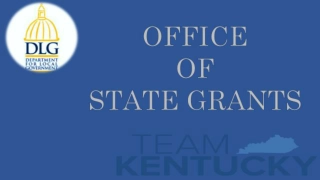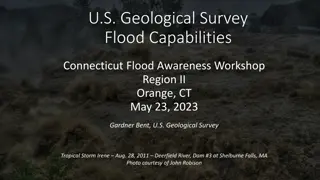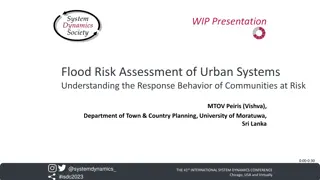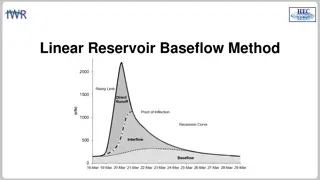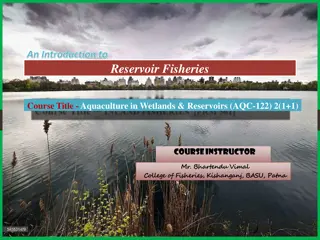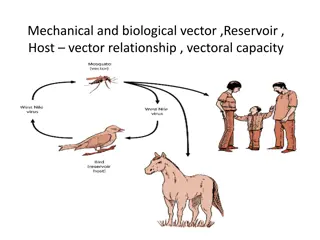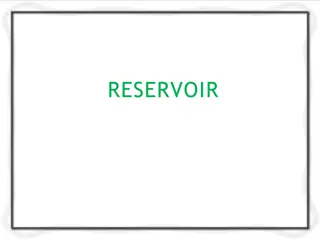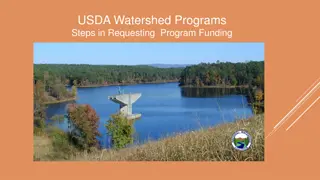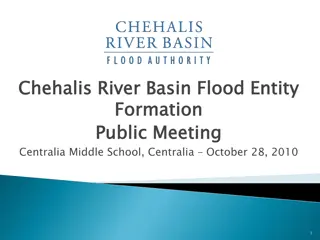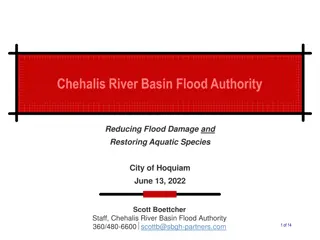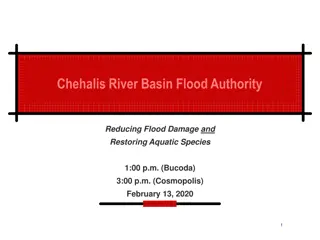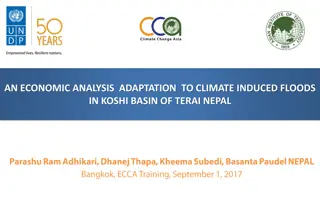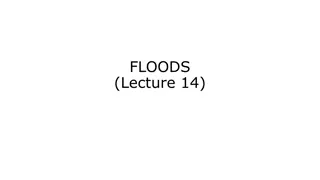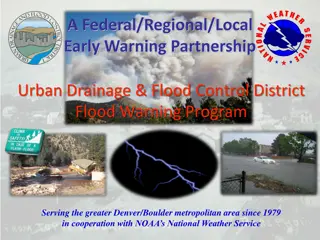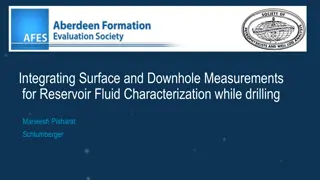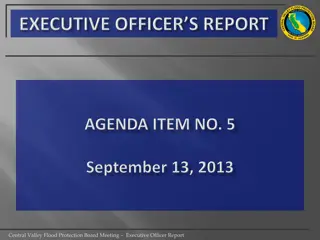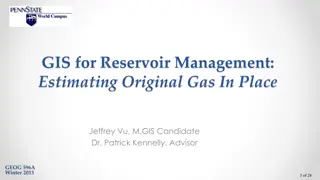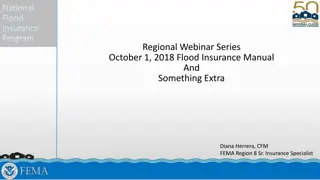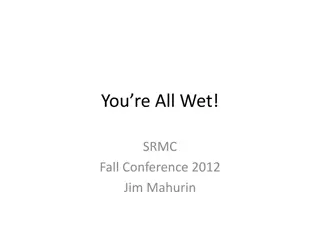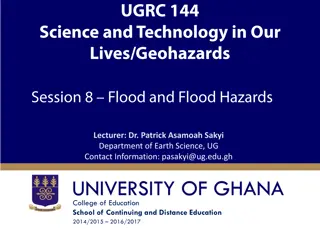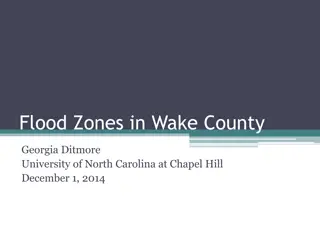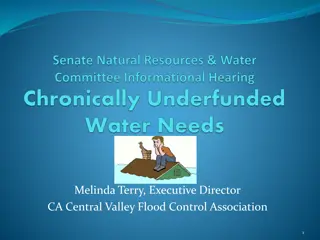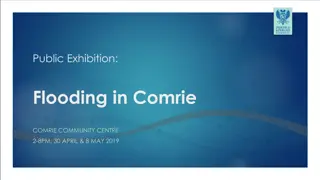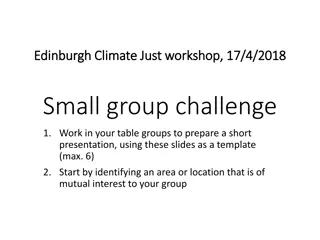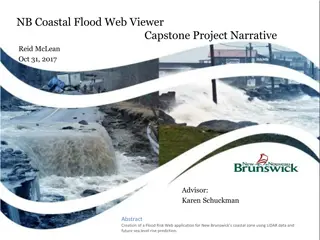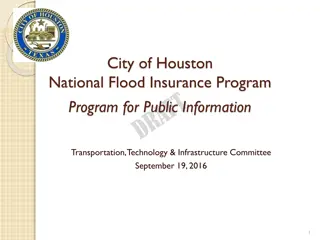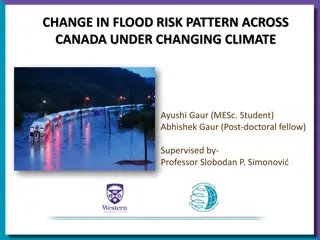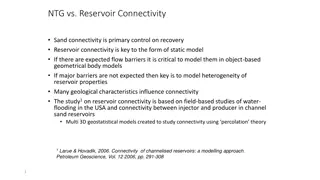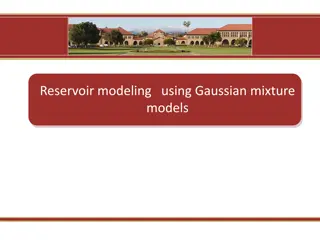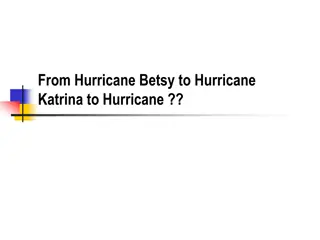Office Of State Grants
The Flood Control Local Match Participation Program (LMPP) provides grants to help local governments meet non-Federal cost-share requirements for flood-related projects, flood control planning, and mitigation activities. Funding can be used as matching funds with various federal agencies and program
2 views • 9 slides
Understanding the National Flood Insurance Program (NFIP) and Floodplain Management
Explore the National Flood Insurance Program (NFIP) and its workshops across Connecticut, covering topics such as flood awareness, certified floodplain management, flood maps, roles and responsibilities, and the significance of the 100-year floodplain. Learn how FEMA, the State NFIP Coordinator, and
0 views • 37 slides
Introduction to Flood Risk Assessment with HEC-FDA Overview
This presentation delves into flood risk assessment using HEC-FDA software, covering topics such as defining flood risk, components of uncertainty, consequences of flood risk, and methods to assess flood risk including hydrology, hydraulics, geotechnical, and economics. It explores the intersection
6 views • 39 slides
Managing Multiple Purposes in Reservoir Operations
Reservoirs with multiple purposes can present challenges in balancing competing needs such as water supply, flood risk management, hydropower generation, and more. Understanding the interactions between these purposes is essential for optimizing reservoir operations and ensuring reliable water suppl
2 views • 24 slides
U.S. Geological Survey Flood Capabilities.
Explore the U.S. Geological Survey's flood capabilities in Connecticut, including real-time streamflow data, precipitation monitoring, groundwater levels, and more. Access tools for flood documentation, peakflow analysis, and national water monitoring through interactive dashboards. Stay informed an
3 views • 19 slides
Understanding Urban Flood Risk and Community Response Behavior
Flood risk assessment in urban systems involves complex interactions among natural, physical, and social elements. Factors such as population vulnerabilities, disparities in socioeconomic status, and post-disaster recovery challenges impact how communities respond to flood events. This research expl
3 views • 4 slides
Understanding Linear Reservoir Baseflow Method
The linear reservoir baseflow method utilizes linear reservoirs to simulate the movement of water infiltrated into the soil. This method models water movement from the land surface to the stream network by integrating a linear relationship between storage and discharge. Users can select from one, tw
0 views • 11 slides
Understanding Reservoir Fisheries and Aquaculture in India
Reservoir fisheries play a crucial role in India, with over 19,000 reservoirs covering millions of hectares. These manmade impoundments serve various purposes such as irrigation and power generation. They are classified based on size into small, medium, and large reservoirs, each with distinct chara
0 views • 28 slides
Vector Relationships and Pathogen Transmission
Understanding mechanical and biological vectors, reservoir hosts, and their role in disease transmission is crucial for effective disease control. Mechanical vectors like flies can transfer pathogens without getting infected, while biological vectors like mosquitoes carry pathogens that reproduce in
1 views • 5 slides
An Overview of Reservoir Types and Purposes
Reservoirs play a crucial role in managing water resources for various purposes like irrigation, hydroelectric power generation, flood control, and more. This article explores different types of reservoirs such as storage, flood control, retarding, and detention reservoirs, along with their function
1 views • 49 slides
Integrated Reservoir Characterization in Semliki Basin, Albertine Graben
Quantitative reservoir characterization using rock physics, seismic, and geological constraints is crucial for hydrocarbon prospect evaluation. This study by Nakajigo Joan explores the integration of these disciplines in the Semliki Basin to improve reservoir property delineation and reduce uncertai
0 views • 24 slides
Understanding USDA Watershed Programs for Local Communities
USDA Watershed Programs offer assistance in addressing natural resource issues such as flood control, repairing flood damages, and rehabilitating flood control dams. The three major components - Emergency Watershed Program (EWP), Watershed Protection and Flood Control Program (WPFO), and Watershed R
0 views • 15 slides
Geomechanical Effects of Oilfield Chemicals on Sand Failure in Reservoir Rocks
This study by Elizabeth O. Wuyep et al. explores the geomechanical effects of oilfield chemicals on sand failure in reservoir rocks. It discusses the role of oilfield chemicals, limitations of previous works, experimental flow chart, and static saturation tests. The research emphasizes the need for
0 views • 25 slides
Addressing Flooding Issues in Chehalis River Basin: Formation of Flood District
Formation of a multi-county flood district in the Chehalis River Basin to combat repeated major flooding events, which have caused significant damages and disruptions over the years. The establishment of the Flood Authority as a temporary entity to address flood issues and the steps taken to mitigat
0 views • 24 slides
Chehalis River Basin Flood Authority's Local Projects and Achievements
The Chehalis River Basin Flood Authority, established in 2008, focuses on flood mitigation strategies informed by science to protect residents and communities. Through various projects like the Raymer Street Pump Station in Hoquiam, the authority has significantly reduced flood damage, enhanced comm
0 views • 17 slides
Chehalis River Basin Flood Authority Update and Collaboration Highlights
The Chehalis River Basin Flood Authority is making significant progress in reducing flood damage and restoring aquatic species through a Basin-wide strategy. The key messages focus on collaboration among various entities and the importance of a multi-phased approach to protect communities. The backg
0 views • 48 slides
Economic Analysis of Climate-Induced Flood Adaptation in Koshi Basin, Nepal
This project aims to assess the impact of climate-induced floods on agriculture in the Koshi basin of Terai, Nepal. By evaluating flood risk, economic costs, and different adaptation options, the study seeks to enhance resilience in the face of increasing flood occurrences catalyzed by climate chang
0 views • 9 slides
Ancient Flood Narratives: Sumerian, Babylonian, and Hebrew Accounts
Ancient flood narratives from Sumerian, Babylonian, and Hebrew sources depict stories of divine displeasure, flood planning, and survival through boat-building. Enlil, Enki, and Yahweh play key roles in warning individuals like Uta-napishtim, Atrahasis, and Noah to build boats and save life forms du
0 views • 8 slides
Flood Warning Program of Urban Drainage & Flood Control District
Since 1979, the Federal/Regional/Local Early Warning Partnership of the Urban Drainage & Flood Control District has been providing the greater Denver/Boulder metropolitan area with early flood threat notifications, primarily for flash floods. Working in collaboration with NOAA's National Weather Ser
2 views • 23 slides
Utilizing Integrated Measurements for Reservoir Fluid Characterization while Drilling
This presentation focuses on the integration of surface and downhole measurements to characterize reservoir fluids while drilling. Topics covered include mud gas data acquisition and evaluation, gas analysis while drilling, challenges in tight and abrasive formations, and environmental corrections s
0 views • 23 slides
Central Valley Flood Protection Board Meeting Executive Officer Report
The Central Valley Flood Protection Board Meeting Executive Officer Report discusses various key topics including personnel, urban and rural levee protection criteria, flood system improvement projects, major proposals, and future projects like the Sutter Bypass 2D Hydraulic Model. The report covers
0 views • 4 slides
Flood Definitions and Impacts on Insurance Claims
Understanding various aspects of riverine and coastal flooding, along with related politics, can shed light on the importance of FEMA flood definitions in determining insurance claim payouts. Topics include floodplain areas like floodway and flood fringe, types of buildings with insurance rates, and
0 views • 27 slides
Estimating Original Gas In Place for Reservoir Management
This study focuses on utilizing GIS technology to estimate Original Gas In Place (OGIP) for reservoir management, with the aim of enhancing oil and gas production, reducing risks, and optimizing recovery. The project outlines the background of reservoir management, introduces the process of volumetr
0 views • 24 slides
National Flood Insurance Program Overview
Explore the details of the National Flood Insurance Program (NFIP) from a regional webinar series, covering policy refresher, rating factors, definitions of flood and building, and more. Gain insights into coverage limits, waiting periods, eligibility criteria, and factors affecting policy qualifica
0 views • 25 slides
Understanding Flood Insurance Coverage in Detail
This comprehensive presentation delves into the intricacies of flood insurance coverage, from primary sources to specific rules and regulations. Key topics include federal flood coverage, property eligibility criteria, private flood insurance limitations, important flood zone measurements, average f
0 views • 22 slides
Understanding the Hydrological Cycle and Flood Hazards
This session with Dr. Patrick Asamoah Sakyi delves into the hydrologic cycle, causes of flooding, and ways to mitigate flood hazards. Topics covered include the hydrologic cycle, stream systems, flood consequences, factors affecting flood severity, and strategies for reducing flood risks. Recommende
0 views • 37 slides
Multiphase Flows in the Upstream: A Comprehensive Overview
This content delves into the complexities of multiphase flows in the upstream sector, covering topics such as reservoir management, drilling, subsurface imaging, and reservoir modeling. It explores the challenges of multi-scale phenomena, multi-physics interactions, uncertainty, and inversion in the
0 views • 4 slides
Factors Affecting Flood Zones in Wake County, North Carolina
Analyze the factors influencing flood impacts in Wake County, North Carolina with a focus on proximity to water bodies, land cover, and impervious surfaces. Explore how county growth affects these factors, potential changes in flood zone areas, and implications for property risks. Consider using hyd
0 views • 15 slides
Comprehensive Integration of 4D Seismic & Production Data for Norne Reservoir Management
This presentation by Nan Cheng of Statoil in 2013 focuses on the integration of 4D seismic and production data for reservoir management at the Norne Oil Field in Norway. Covering topics such as field structure, zones, official reserves, production profiles, and subsea development solutions, it provi
0 views • 17 slides
Enhancing Flood Disaster Management through Integrated River Basin Approach
Explore the framework for effective Flood Disaster Management through a holistic approach, focusing on river basins' characteristics, environmental impacts, flood triggers, and sustainable solutions. Emphasizing the importance of urbanization management and governance for Disaster Risk Reduction to
3 views • 24 slides
Central Valley Flood Control Association - Addressing Flood Challenges in California
The Central Valley Flood Control Association (CCVFCA) works to mitigate the impact of regular floods that occur in California, causing significant damages and evacuations. With a history dating back to 1926, the CCVFCA addresses funding needs, state responsibilities, and challenges in ensuring publi
2 views • 12 slides
Public Exhibition on Flooding in Comrie at Community Centre
A public exhibition is being held at Comrie Community Centre to address flooding issues in the area. The presentation will cover topics such as the Tay Local Flood Risk Management Plan, actions on flooding, and next steps. The Tay FRM Strategy and Local FRM Plan outline measures to manage flood risk
0 views • 19 slides
Enhanced Flood and Tax Map Tools in West Virginia
Explore the upgraded WV Flood Tool, offering 3D flood visualizations, building-specific risk assessments, and improved data layers. Additionally, access individual finished tax maps with detailed parcel information and contextual data for 30 counties statewide. The tools provide dynamic web maps, ae
0 views • 8 slides
Exploring Social Flood Risk and Vulnerability in Edinburgh: A Climate Justice Workshop Analysis
Dive into an in-depth analysis of the social flood risk and neighborhood flood vulnerability in Edinburgh through a workshop presentation. Explore how climate change will impact flood risks, identify vulnerable groups at high risk, and make a compelling case for action towards climate justice.
0 views • 6 slides
Creating a Coastal Flood Risk Web Application in New Brunswick
Addressing flood risk reduction in New Brunswick, this project utilizes LiDAR data and sea level rise predictions to identify flood hazards, plan for community resilience, and communicate mitigation strategies. With a focus on coastal zones, the initiative aims to provide accurate flood hazard maps
0 views • 18 slides
Houston National Flood Insurance Program Overview
The City of Houston's participation in the National Flood Insurance Program includes enrollment since 1979, adherence to FEMA floodplain maps, and setting local construction standards. The Community Rating System (CRS) is utilized to enhance flood loss reduction, improve insurance rating accuracy, a
0 views • 11 slides
Analyzing Flood Risk Pattern Changes in Canada Under Climate Shift
The study delves into the evolving flood risk patterns across Canada amidst a changing climate scenario. By employing advanced models and methodologies, the research aims to project future flood occurrences and assess the associated risks. Through meticulous data collection and analysis, the team is
0 views • 15 slides
Understanding Reservoir Connectivity and Its Impact on Recovery Models
Sand connectivity plays a crucial role in reservoir recovery, with reservoir properties' heterogeneity influencing connectivity. Field-based studies in the USA focus on water-flooding and injector-producer connectivity in channel sand reservoirs. Geostatistical models using percolation theory help s
0 views • 4 slides
Reservoir Modeling Using Gaussian Mixture Models
In the field of reservoir modeling, Gaussian mixture models offer a powerful approach to estimating rock properties such as porosity, sand/clay content, and saturations using seismic data. This analytical solution of the Bayesian linear inverse problem provides insights into modeling reservoir prope
0 views • 10 slides
Understanding Flood Control Acts and Related Legal Cases
Explore the history and implications of flood control acts like the Flood Control Act of 1928, including the immunity provisions for the United States in case of flood-related damages. Learn about the Compensation Clause and the procedures for suing the government for flood damages under the FTCA. D
0 views • 37 slides
